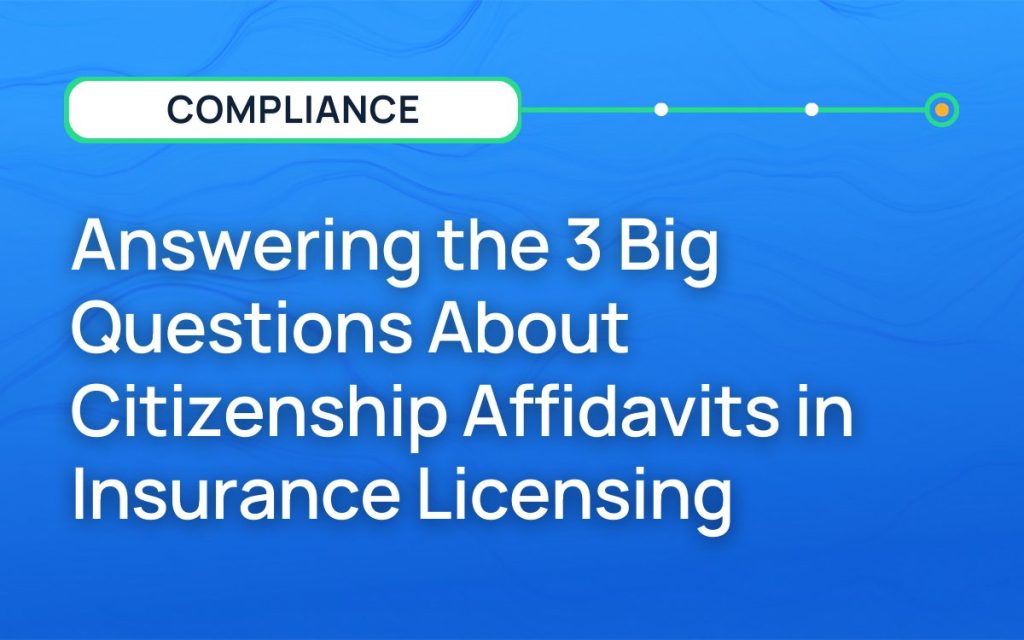Answering the 3 Big Questions About Citizenship Affidavits in Insurance Licensing

An insurance license can be the doorway to a rewarding and lucrative career. You might even say insurance is a field ripe for the making of the American Dream. So, how does it work for those who aren’t U.S. citizens?
Well, states take differing views on subjects like undocumented immigration or overstayed visas, and the insurance industry isn’t immune from political theater.
We can’t address all the varied nuances in a blog like this, because each situation has different exceptions, exemptions, additions, etc. But, we can expose the divide between states that take more restrictive approaches to noncitizen licensees and states that take a broader approach to who may be licensed, and some of the signs to look out for when deciding whether to apply for a license in any given state.
Of course, none of the following is intended to be legal guidance, but serves as a springboard into deeper, more state-specific research for anyone faced with a particular circumstance.
Do states require me to report my citizenship to get an insurance license?
Maybe – individual states take very individual approaches.
We bet you already knew that, though! If this isn’t your first brush with insurance, you’re likely all-too familiar with the nuances that come with questions about who needs what for which licenses and where. So, yes, questions about citizenship vary state to state (like nearly everything in insurance).
States that require citizenship documentation for a producer licensing application
It’s quite common for states to require some sort of documentation for insurance license applicants who aren’t U.S. citizens. But two states take the approach of requiring all applicants to upload proof of their citizenship status.
Georgia
In the Georgia licensing handbook, the procedure for applying to get a producer license requires applicants to sit the exam and then complete a citizenship affidavit:
“New license applicants are required to submit a notarized Citizenship Affidavit Form (GID-276-EN) attesting to either United States citizenship or lawful presence.”
Once the affidavit is complete, then you can proceed to the actual licensing process.
Alabama
Alabama, too, requires proof of citizenship from all applicants before the state will process the license or renewal application.
The state has a lengthy list of possible acceptable documentation, although it also points out that things like drivers’ licenses and state IDs from other states are only acceptable if that state requires you to prove your citizenship to obtain that ID.
The state’s FAQs also make it clear that your home state (or resident state) license can’t be the basis for proof of citizenship because some states don’t require you to prove your citizenship.
How can noncitizens get an insurance producer license?
At least 13 states besides Alabama and Georgia require noncitizen producers and would-be producers to provide “proof of U.S. work authorization” documentation of some kind – including an Employment Authorization Document or EAD – to get a license.
According to NOLO, the following documents may be sufficient proof of work authorization:
- an unexpired foreign passport with an I-551 stamp
- an alien registration receipt card or permanent resident card
- an unexpired EAD, issued by U.S. Citizenship and Immigration Services, which contains a photograph, or
- an unexpired foreign passport with Form I-94 containing an endorsement of nonimmigrant status.
If you’ve jumped through the many hoops of federal procedure to obtain a permanent residency or an EAD for noncitizens, then, when required, you must upload the relevant documentation to the National Insurance Producer Registry’s Attachment Warehouse. As long as your documents are up-to-date in this NIPR file repository, then you should have little trouble maintaining your license and reciprocity across states.
Can you get an insurance producer license if you overstayed your visa or are an undocumented resident of the U.S.?
Obtaining an insurance license, like many other activities, is quite fraught for U.S. residents who aren’t citizens and who don’t have a work authorization, and who don’t have a path to obtain either.
Some states have laws that seem to signal their openness to allowing undocumented residents to apply for and earn insurance licenses.
For instance, in 2021, Colorado repealed legislation that previously required state administrators to validate citizenship and work authorizations for professional license applicants. The new law is called, “Remove Lawful Presence Verification Credentialing.“ A state summary of the legislation said, “The act also specifies that lawful presence is not required of any applicant for any state or local license, certificate, or registration. The act is a state law within the meaning of the federal law that gives states authority to provide for eligibility for state and local public benefits to persons who are unlawfully residing in the United States.”
To that effect, in 2022, the state’s DOI repealed the bulletin that previously required proof of citizenship or proof of work authorization. These changes imply, without explicitly stating, that applicants in Colorado need not have documentation to verify their work or citizenship status in order to get a license with the DOI. California, as well, although it requires a background check with full fingerprints through the Federal Bureau of Investigation, doesn’t require documentation of work authorization.
Yet, as the legislative summary suggests, state law can only operate “within the meaning of the federal law,” which brings us to the federal Immigration Reform and Control Act.
Impact from the federal Immigration Reform and Control Act
Signed under the Gipper, the 1986 Immigration Reform and Control Act imposes the requirement that employers keep records of their employees and employees’ citizenship status. This includes requiring employees to validate their legal ability to work. So, even in a state like Colorado where an undocumented resident might obtain a license, there’s no guarantee that they’ll be able to find employment as an insurance producer.
Further, the split of state requirements can make it more difficult to work across state lines because, should you find employment and licensure in Colorado even without a work authorization, you may still be barred from getting a nonresident license anywhere else.
The reality is, for everyone who isn’t a citizen, or even for those who are, there may still be a lot of paperwork standing between where you are today and where you want to be, with licenses and appointments in hand.
While AgentSync can’t do anything for the myriad vagaries of the U.S. immigration system, we can make handling licensing and appointment compliance for producers, adjusters, and variable lines brokers less hellacious. To see how we can help you increase your speed to revenue, drive efficiency, and onboard or terminate seasonal teams in bulk for peak compliance, schedule a demo.

